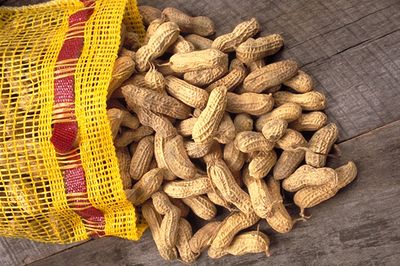Spotlight shines on peanuts
Salmonella scare has many on alert

A massive recall of foods that might contain salmonella-tainted peanuts has the whole nation looking askance at foods once noshed with abandon.
The lesson is a familiar one to those with food allergies: Peanuts and peanut products can appear in all manner of unexpected foods, from egg rolls and ice cream to chili, candy and chocolate.
“People who are sensitive or allergic to items really get good at being supersleuths at finding them,” says Dee Sandquist, spokeswoman for the American Dietetic Association.
For the moment, everyone else would be wise to turn detective, too. The government has warned consumers to check foods containing peanuts and peanut products against a list of recalled products, available at www.fda.gov.
The good news is national brands of jarred peanut butter sold directly to consumers, as well as the perennial must-have Girl Scout Cookies, so far have been unaffected by the recalls.
The bad news is the outbreak – possibly linked to the deaths of eight people and illnesses of more than 500 in 43 states – has been traced to a Georgia plant that processes peanuts for institutions and food companies.
And those peanuts have found their way into hundreds of prepared foods, from cookies and cakes to ice cream and snack bars, even pet food. So far, more than 430 products have been recalled.
In packaged foods, finding peanuts usually is just a matter of looking at the labels, says Anne Munoz-Furlong, founder of The Food Allergy & Anaphylaxis Network, an advocacy group. Manufacturers must label foods that contain peanuts.
That’s good, because items such as SunRidge’s Energy Nuggets and Archer Farms’ Milk Chocolate Monster Chewy Soft Baked Cookies don’t give consumers much of a clue by name alone. Both products have been recalled.
“Anything you’re buying, particularly if it’s a processed food, read the label,” says Ann McMeans, a dietitian with the Children’s Nutrition Research Center at Baylor College of Medicine. “Anything that’s a mixture of foods, read the label.”
Foods with few ingredients, such as produce, meat, seafood and dairy products, are the easiest, she says. Not only will it be more obvious if peanuts are involved, the labels also will require less deciphering.
While mostly a concern for people with allergies, peanuts can slip into products under guises that are less than obvious, such as oils or even artificial nuts (peanuts flavored to taste like other nuts).
A tougher time is had in restaurants, which are not subject to labeling regulations. Determining whether menu items contain peanuts or peanut products can take aggressive questioning of waitstaff and cooks, says Munoz-Furlong.
“Enchilada sauce, chili sauce, meat marinades – these are places you wouldn’t expect peanut butter,” but where it nevertheless is common, she says. “We have learned that the hard way.”
Asian and other ethnic cuisines commonly have hidden peanuts, says Dr. Vivian Saper, an associate professor of allergy and immunology at Stanford University School of Medicine and Lucile Packard Children’s Hospital.
Spring rolls and egg rolls often are “glued” shut with peanut butter. Many Thai dishes are garnished or tossed with crushed peanuts. Vegetarian meat substitutes also often contain peanut products.
People with peanut allergies are used to thinking about cross-contamination. Even if a food doesn’t contain peanuts, if it was produced or prepared on equipment that uses peanuts in other foods it must be treated as suspect.
Cross-contamination is less a threat with salmonella. While even a gram of peanut can be life-threatening to someone with allergies, the immune systems of most healthy people can fend off salmonella.
But that doesn’t mean cross-contamination can’t happen. The recalled products include pet foods and treats. While the risk to the animals is low, the concern is that people touching the pet foods could transfer the bacteria to themselves or others.
If any good can come out of the salmonella scare, it might be an increased awareness of what is in our food and the dangers those ingredients can pose to some people, Saper says.
“Welcome to the world of the poor individuals who have peanut allergies,” she says. “This is an inside look at the fear that patients and their families go through.”